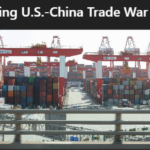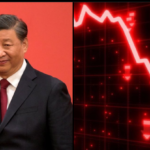On April 9, 2025, China announced the imposition of an additional 84% tariff on all U.S. imported goods, escalating the ongoing trade conflict between the two nations. This decision came in direct response to the United States’ implementation of a cumulative 104% tariff on Chinese imports. citeturn0news25
Background of the Trade Dispute
The trade tensions between the U.S. and China have intensified over recent months. In early 2025, President Donald Trump initiated a series of tariffs aimed at addressing trade imbalances and encouraging domestic manufacturing. On April 2, 2025, dubbed “Liberation Day,” the U.S. imposed a minimum 10% tariff on all imports, with elevated tariffs on 57 nations, including a significant increase targeting Chinese goods. This led to a cumulative 104% tariff on Chinese imports as of April 9, 2025. citeturn0search56
China’s Retaliatory Measures
In retaliation, China’s Ministry of Finance announced the increase of tariffs on U.S. goods to 84%, up from the previously imposed 34%. Additionally, China included 12 U.S. companies in its export control list and six others in its unreliable entities list, effectively restricting their operations within Chinese markets. citeturn0news31
Global Market Reactions
The escalation has had immediate impacts on global markets. European markets experienced significant declines, with major indexes such as the FTSE 100, Germany’s DAX, and France’s CAC 40 all falling by around 3%. In contrast, Chinese stock markets saw modest gains, attributed to government interventions aimed at stabilizing the economy. citeturn0news25
Statements from U.S. Officials
U.S. Treasury Secretary Scott Bessent addressed the situation, labeling China’s retaliatory tariffs as “unfortunate” and suggesting that all options remain on the table, including the potential removal of Chinese companies from U.S. stock exchanges. Bessent emphasized the need for China to engage in fair trade practices and warned against currency devaluation as a means to counteract the tariffs. citeturn0search5
Potential Economic Implications
Economists warn that the escalating tariff war could lead to increased consumer prices and hinder economic growth in both countries. Sectors such as agriculture, technology, and manufacturing are expected to be significantly affected. The prolonged dispute may also disrupt global supply chains and contribute to market volatility. citeturn0news26
Conclusion
The reciprocal imposition of tariffs between the United States and China marks a significant escalation in their trade conflict, with far-reaching implications for global markets and economies. Both nations face mounting pressure to negotiate a resolution to prevent further economic fallout.




